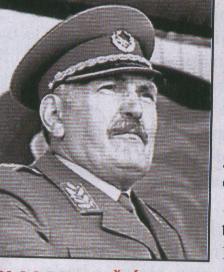 |
‘We shall take vengeance on the Turks’
by Sonja Biserko

2006 will be a decisive year for Serbia, since it seems that the international community has decided finally to settle the crisis created by the break-up of Yugoslavia. The unresolved status of Kosovo and Montenegro has permitted the illusion about the feasibility of the Serb national project, or more precisely its expansionist aspirations, to be maintained. The end of the process also involves, of course, pressure on Serbia to cooperate with The Hague tribunal, including surrendering Ratko Mladić.
The government’s attempt finally to ‘deliver’ Mladić failed once again. The hysteria created in regard to this unleashed another anti-Hague campaign: The Hague once again became ‘a place where one must contest the obdurate lie behind which the true international butchers and criminals hide’. The same mind offers the opinion that ‘luckily the number of those who believe in the black tale of Srebrenica is in decline; it is becoming a burden even for its alleged victims’. It is said that ‘the fabrication about Srebrenica was thought up before the routine liberation of the kasaba [provincial town]’, as was the ‘mass nature’ of the crime: Srebrenica was chosen because it ‘borders Serbia and in order to punish Serbia’. Another argument in the same mode is that the Serb army ‘did not enter a single non-Serb village, except when forced to by reason of self-defence’. Ratko Mladić, however, said on the occasion of the conquest of the village of Osmača that it was ‘a big Muslim village which no Serb had ever entered before we liberated it’.
Optimal solution
It is increasingly likely that the status of Kosovo will be resolved with some speed, and that its independence (whether full or conditional) represents the optimal solution. The Serb Radical Party - and before it the Serbian Orthodox Church - proposed that in that eventuality Kosovo should be proclaimed an occupied land. [Radical leader] Tomislav Nikolić and the Serbian prime minister [Vojislav Koštunica] have allegedly agreed on this. Government representatives stress privately that Kosovo’s independence is ‘a given’, which brings a degree of relief to everyone; but publicly they continue to insist that they will not accept any such solution. The media keep up their anti-Albanian campaign, some warning that ‘Kosovo independence means the creation of an Islamic terrorist state in Serbia’s belly’. It is also alleged that ‘the Serbs living in their Kosovo ghettoes are preparing for a quick flight’, and that Slobodan Milošević was ‘the first European statesman whose army and police fought bravely against organized terrorism, a militant, brutal and Islamic terrorism that was destroying Christian places of worship and killing Christians’.
The award for the Bosnian film Grbavica came unexpectedly into the focus of Serbian public attention. Its winning of the Golden Bear at the Berlin film festival was received in Belgrade as an award against ‘criminal Serbs’. It is said that the film was not about ‘the rape of women in wars’, but represented ‘anti-Serb propaganda and a renewed fanning of inter-national hatred and besmirching of the Serb people’. Meanwhile the Bosnian lawsuit against Serbia-Montenegro filed with the International Court of Justice in The Hague also caused stormy reactions, with the media focussing on war reparations that will be ‘paid by our children’.
The presentation of the bill for the failed Serb national programme could have been foreseen by any minimally serious analyst of the Balkan situation. So the extent to which the Memorandum Serbs lulled themselves into perpetual expectation of another outcome, one that would show retrospectively that they were right, is quite unbelievable. Their moral duty is to lay out their failures before the public, and to accept responsibility for what has befallen their children’s generation, a generation that will increasingly be confronted with films like Grbavica and other artistic interpretations of the Yugoslav wars.
The sentence spoken by Ratko Mladić on the occasion of the ‘liberation’ of Srebrenica, 11 July 1995 - ‘On the eve of yet another great Serb festive day we offer this town as a gift to the Serb people; the moment has finally arrived, following the rebellion against the dahija [Ottoman tyrant], for us to take our vengeance on the Turks in this area.’ - is a logical outcome of the atmosphere created during the preparations for war in the Yugoslav area. We are referring to the role which a part of the Serbian intellectual and cultural elite, especially the academicians gathered around the Memorandum, played in the destruction of Yugoslavia.
Role of the Serbian Islamicists
It is necessary to recall that especially active in this circle were the Serbian Islamicists, whose ‘special task’ was to demonize Yugoslavia’s Muslim population. Because ‘the Muslims were a particularly vulnerable community, due to specific geopolitical conditions, and because their status obstructed the creation of a Great Serbia’. This was of key significance for the policy of their physical extermination and deportation. Well in advance of the start of the war, the writers of the Memorandum began to articulate negative stereotypes about Muslims as a foreign, inferior and dangerous element. A favourite theme was their numerical weight, which threatened to turn the Serb people into a minority in their own land. One of the authors of the Memorandum, the prominent Yugoslav demographer Miloš Macura, argued at a conference on Kosovo held in 1988 that: ‘their demographic aims, which do not differ essentially from those of the past, derive evidently also from contemporary aspirations.’ According to him ‘the pro-Islamic and pro-natality ideology finds strong support in Islam’, i.e. ‘the pro-natality awareness is supported by [Albanian] tribal/clan heads, by hodže [religious leaders], and by parents, so that behind this profuse and uncontrolled procreation we find the three most important institutions of the traditional society: clan and tribe, Islam as an organized religious community, and family as a significant social institution.’ Miroljub Jeftić also warned that the Muslim world can realize its aim of living ‘in the Balkan area in accordance with the word of Allah’ only when the Muslims have achieved a demographic dominance and with it the strength to realize that aim. According to Jeftić, a religion telling the Muslims that to have as many children as possible was a pious duty was being used to advocate a high birthrate. In his view, the world-wide Islamic planners had the task of Islamicizing all of Serbia as the first step in their thrust into Europe.
In a series of articles that they wrote for daily and weekly publications, as well as for the army paper Vojska, professors Darko Tanasković and Miroljub Jeftić regularly presented Islam as backward and violent. A special theme, however, was the betrayal of the Bosnian Muslims, who had allegedly converted to Islam. At the time of the most virulent anti-Muslim campaign in late 1991 and early 1992, i.e. when it was becoming clear that Bosnia-Herzegovina would not remain in Milošević’s ‘Yugoslavia’, Tanasović interpreted the Bosnian Muslims’ appeal to Turkey for help as ‘their furtive return to the old-time position of poturice [converts from Christianity to Islam]’: for the Serbs, he recalled, poturice were ‘worse than Turks’. Tanasković warned: ‘To threaten the Serbs with Turks is even worse and more ominous than to threaten them with Germans.’ The notion of Islamic fundamentalism as the greatest threat to Yugoslavia, far more important than Serb-Croat relations, was assiduously promoted . There were warnings about the realization of Islamic ideas in the Sandžak and Bosnia, although the main stress was on the Albanians. They spoke of the danger of Albanization, which led inevitably to the obliteration of Christian churches, graveyards and population, the building of mosques, and spread of the Muslim way of life.
But they also often used and publicized abroad works by the writer Ivo Andrić, the only former Yugoslav to win a Nobel prize, about ‘the controversies and misfortunes of the Dark Vilayet’, quoting in support his ‘Letter from 1920' in which he wrote about ‘Bosnia, a land of hatred and fear’. They skilfully publicized the thesis that ‘the domestic Muslims have been the bearers of genocide from "the slaughter of the knezi [village leaders]" until this day’, and that they had tried to ascribe these crimes to ‘ethnic Turks in order to cover up their tracks and consign the crime and their perpetrators to oblivion’. They peddled, in addition, arguments about supposed links between Islam and the activities of Bosnian and Kosovo politicians. They stressed that Christian Bosnia had been destroyed in the name of Islam, and that those who ‘had accepted Islam had betrayed Bosnia’. They insisted that ‘Islam arrived as a consequence of occupation, that acceptance of Islam was treachery’.
At public appearances, prominent political leaders and academics advocated genocide as a legitimate instrument for the realization of just aims. The biologist Biljana Plavšić argued that ‘Muslims are a genetically deformed people’, their genes having remained unchanged through generations. She is remembered also for her statement: ‘I would prefer to cleanse all of eastern Bosnia of Muslims. When I say cleanse, don’t take me literally in the sense that I advocate ethnic cleansing. But they have foisted upon us the term ethnic cleansing to describe what is a perfectly normal phenomenon, and qualified it as a war crime.’
The anti-Muslim campaign that lasted for over thirty years psychologically prepared Serbian citizens for what would later happen to the Muslims in Bosnia, the Sandžak and Kosovo. This campaign is still being pursued, with the difference that it is now placed in a world context: the Serbs, it is alleged, are fighting against Muslim terrorism. The demonization of innocent Muslims, and the use of brutal methods ranging from persecution to genocide, have left a deep imprint upon relations in a region in which Serbs and Muslims continue to live next to one another. A revival of mutual trust is impossible without the acceptance of this truth.

Blagoje Adzic
Translated from Helsinška Povelja (Belgrade), nos 91-92, January-February 2006
|